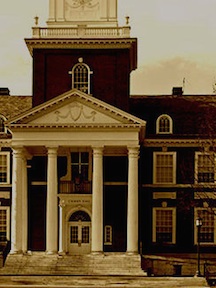By Krysta M. Larson
Johns Hopkins University—home of the Alpha of Maryland chapter of ΦBK, founded in 1895—may face the closing of its Humanities Center in July of next year. The 50-year-old interdisciplinary department, which houses two PhD programs, an MA program, an undergraduate honors program, and a number of undergraduate courses, will be reviewed by a small, neutral committee that will submit recommendations for the department’s future in mid-December.
In June of this year, Beverly Wendland, the James B. Knapp Dean of the Krieger School of Arts and Sciences, submitted a letter to colleagues informing them about the decision to review the Humanities Center. This review, the third that the center has undergone since 2011, was partially initiated following the retirement of two of the Humanities Center’s seven faculty members. According to a message from the dean posted on the Krieger School of Arts and Sciences News & Events page, Wendland felt that these circumstances “provided a natural moment to stand back and consider some of the longstanding concerns that have been raised.” Foremost among these concerns, Wendland wrote, are that the Center lacks a comprehensive academic mission, that the center has not provided strong programming for undergraduates, and that the center’s name indicates that its offerings are more broad than they actually are.
Following the June announcement, current members of the Humanities Center, particularly graduate students, took steps to express their support of the department. An online petition to Johns Hopkins President Ronald J. Daniels, which had more than 4,000 signatures as of mid-November, claims that the Center “has formed generations of innovative young scholars, promoted precious and productive conversations across the humanities and social sciences, and played a crucial role in maintaining Hopkins’ reputation in the fields of humanistic studies in the US and abroad.” A website created in support of the Center says that its closure would “bring irreparable damage to the humanities at Hopkins and to the reputation of the university as a teaching and research oriented institution invested in all academic fields.” The website also features letters and statements from other Johns Hopkins community members who have expressed their concerns regarding the review of the center including faculty, alumni, and undergraduate students.
Other Johns Hopkins faculty members and administration, however, feel that changes made to the Humanities Center would not have a significant impact on the pursuit of the humanities at the university. Vice Dean for Graduate Education Matthew Roller (ΦBK, Stanford University, 1988), a Classics professor who also serves as president of the university’s Phi Beta Kappa chapter, said that “the humanities at Hopkins are in a very good place—we’ve been investing heavily in the humanities in precisely the period in which other institutions have been disinvesting.” Among these areas of growth in the ten departments devoted to the study of the humanities at Johns Hopkins have been the addition of 20 new tenured/tenure-track faculty members in the last seven years. The university also recently received a $10 million grant to open the Alexander Grass Humanities Institute, which was the largest ever contribution to Johns Hopkins that was devoted solely to the study of the humanities. The institute, according to Roller, “accommodates humanistic inquiry across the whole range of the humanities, and has resources for undergraduates, grad students, faculty, and the public.”
President Daniels has also defended Wendland’s decision to review the Humanities Center. In a university newsletter, he says that the review is “not about the humanities at large — it is about the fate of a distinct department that is undergoing significant intergenerational change.” He says that he, like Wendland, is not committed to any particular course of action but supports the need to reevaluate the center’s purpose on campus. Though the pursuit of excellence in both the sciences and the humanities at Johns Hopkins is strong, it is clear that the Humanities Center in particular holds a special place in the hearts of many students, faculty, and alumni at the university.
Krysta M. Larson is a senior at Creighton University double majoring in English and journalism. She is a recently inducted member of Phi Beta Kappa. Creighton is home to the Beta of Nebraska Chapter of Phi Beta Kappa.




